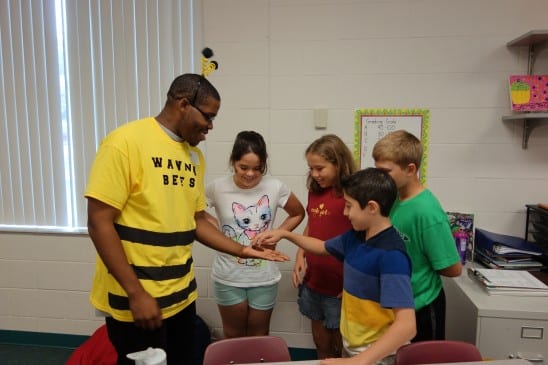UCF Shares A Love of Bugs With Young Children
 Hojun Song, an entomologist at the University of Central Florida, loves bugs and he wants others to learn to love them, too.
Hojun Song, an entomologist at the University of Central Florida, loves bugs and he wants others to learn to love them, too.
Insects play a critical role in the food chain and in keeping our environment healthy, he said. For example, honeybees are needed to pollinate crops, which humans rely on for food. Certain insects are food for fish and birds that would otherwise die without their main source of protein.
Insects are important, and that’s the message Song and 24 students in his entomology class at UCF are delivering to fifth-graders at Carillion Elementary School in Oviedo each week.
Song, an assistant professor of biology, and his students are visiting the school every Wednesday in October to help enrich the school’s science lessons. This service-learning project, which is incorporated into Song’s entomology course, is designed so his students will apply the knowledge taught in the course to address community needs and to gain an appreciation for the relationship between the general public and academia. Earlier this summer, Song worked with classroom teacher Teresa Riedel to create lesson plans that deliver knowledge that aligns with the Sunshine State Standards, are hands-on and fun.
“Dr. Song talks about how insects are so important in our lives, like the bees,” Riedel said. “And the college students bring so much creativity and excitement. During the sessions on bees, for example, they came dressed like bees and played games with the students to get them to understand the role they play in nature.”
During another visit, Song’s team took bug samples from UCF’s Bug Closet to show. The Bug Closet is one of the best collections of insects in the Southern states with more than 500,000 specimens. The collection is one of the reasons Song joined UCF’s biology department in 2009.
Riedel, a long-time K-5 science teacher, said the key to getting children interested in science is to make it exciting and relevant to their everyday lives.
“I tell my students that scientists are cool and curious people,” Riedel said. “I also tell them that scientists end up doing some pretty amazing things, travel to some interesting places, and discover many new things. Science is really exciting.”
About 45 students join in the weekly lessons at the school. For Song, the partnership with Carillion is just the right thing to do. First, he’s helping build interest in science among young children, which he hopes will result in a new generation of scientists. He’s also giving his college students a productive experience by having them pass on their knowledge and enthusiasm to young children.
“I enjoy doing it,” Song said. “It is very important to me that we continue to educate our future scientists. What is also exciting is how much my entomology students have enjoyed the entire process of creating and preparing for lessons and engaging with the fifth-graders. This service-learning model is a very effective way to educate both college students and K-12 students.”
So far the fifth-graders have learned about the structure and function of insects and the relationship between some insects and their environment.
Song, whose published research focuses on grasshoppers, is not sure he’ll take locusts to the school, but he hopes the Carillion students get as excited about insects as he is.
What’s so fascinating about grasshoppers?
Certain species display some rather unique characteristics, changing colors and their behavior when they are in a swarm. When alone, they are docile creatures, but once they get into a crowd, a crowd mentality kicks in, he explained.
“Most people in the United States only think of locust swarms because of what they’ve read in the Bible,” Song said while observing grasshoppers in the lab. “But they are fairly common in other parts of the world causing millions of dollars worth of damage. We’re trying to figure out why they swarm and if we can do that, we hope it will help us prevent them from doing so.”
Song has a Ph.D. in Entomology from Ohio State University. He completed his undergraduate degree at Cornell University. He serves on several editorial boards and had published numerous academic articles. He runs the Song Laboratory of Insect Systematics and Evolution and is the curator of UCF’s Bug Closet. Funding from the National Science Foundation (IOS-1253493) currently supports Song’s research program.
To find the original article, click here.
